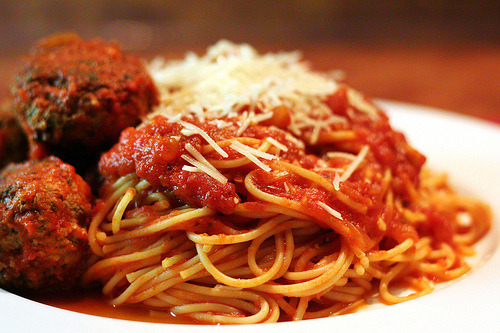What is Carb Cycling?
Carb Cycling diets, also known as carb rotation diets, were made popular by books such as Jay Robb’s The Fat Burning Diet and The Carb Rotation Diet by Jayson Hunter. However, carb cycling is nothing new, having been used in the body building world as a method for burning fat and building muscle for some time.
Essentially carb cycling involves a cycle (as the name suggests), of low or no carb days with days when you are allowed to eat carbs. The idea is you get some of the benefits of a low carb diet, but avoid the flat lethargic feelings or carb cravings that can occur if the body is deprived of carbs for too long.
There are many different approaches to carb cycling, with the length of the cycle being the main variant. Some choose to follow a low carb eating plan for five days a week and then have two high carb days (this plans fits in nicely with the weekend!), although the high carb days do not need to be consecutive. Others follow a shorter rotation, with two low/ no carb days followed by one high carb. Carb intake on the no/low carb days varies, but in his Carb Rotation Diet, registered dietician Jayson Hunter recommends using a low carb approach rather than eliminating all carbs in order to make the diet easier to stick to.
In general on high carb days you should obtain about 50% or less of your daily calories from carbs, whilst on lower carb days this should be reduced to zero to 50 grams per day. Overall calorie intake on low calorie days should also be lower. When starting the diet, you need to calculate your required daily calorie intake and work out how much carbohydrate you should be eating. If you are aiming for a healthy weight loss of one to two pounds per week, make sure that your calorie intake on low carb days is low enough to achieve this.
Aside from varying carb intake, most carb cycling or rotation diets also promote a diet of healthy foods such as fruit, vegetables, low GI, high fibre carbohydrates, low saturated fats and a moderate intake of healthy unsaturated fats. Many also recommend avoiding any form of sugar (with the exception of that in fruit) and refined carbohydrates.
Carb Cycling claims
The theory behind carb cycling diets rests on the idea that we can ‘trick’ our body into maintaining muscle mass and dropping fat when we vary the amount of carbs we eat day to day. Promoters of these diets have suggested that methods designed originally for heavy lifters can also be beneficial for the rest of us, who far from wanting to look like pumped up gorillas would just like to lose a little flab from our hips. In The Fat Burning Diet, Jay Robb says that when we eat carbs this stimulates the release of insulin, a hormone required to help cells utilize blood sugars for energy. This is a sound principle, acknowledged by scientists around the world. If we don’t burn this energy, it is stored as fat. Robb goes on to suggest that if we keep our body guessing, by mixing up carb intake, this will stop it from storing the extra energy as fat.
This theory is based on controlling glycogen levels. Glycogen is the form in which we store broken down carbohydrates in our muscles and liver for energy. These stores are used up as we exercise, or simply go about our normal day to day lives, and need to be replenished. By only eating carbs every few days, the idea is that the stores of glycogen are replenished when needed, but not saturated. If you consume more carbohydrate than can be stored as glycogen, it will be stored as fat. In theory this means we are only refuelling those stores when we need to, in order to maintain energy levels.
What are the benefits of Carb Cycling?
Weight Loss
Many followers report significant weight loss on this type of diet, and a lot of low carb dieters claim to have used it successfully to break through weight loss plateaus. Carb cycling is likely to lower your calorie intake to a level that promotes weight loss
Healthy Diet
Many carb cycling diets offer meal plans which promote healthy diets rich in vitamins, minerals, fibre and unsaturated fats, which aside from contributing to weight loss will make you feel better and may offer some protection from lifestyle diseases. Make sure you choose a diet that promotes a healthy balanced diet, or run it past a dietician to check you will be meeting nutrient requirements. The Carb Rotation Diet was created by a registered dietician, and the recommended meal plans reflect this.
It’s easier than low carb!
As this diet is essentially a more relaxed version of a low carb diet, it should be easier to follow. The diet is less restrictive as you are allowed to eat carb based foods every few days, meaning you are less likely to fall of the band wagon.
What are the drawbacks?
Limited scientific evidence
Whilst the theory behind the diet is based on the known biochemistry of the body, there is little actual evidence to suggest that it will promote weight loss. There is a definite lack of scientific controlled studies done in this area to support the theory and draw attention to possible side effects.
Carb cravings
There is also a possibility that as you are eating carbs every few days, this may make it harder for your body to function without them on the low carb days. Some followers report increased cravings for carbs with a cycling diet than with a traditional low carb, when the body is more accustomed to the lack of carbohydrate.
Carb Binging
Whilst carbs are allowed on given days, it is essential that you don’t go overboard. Having carb free days may make you crave them which in turn may lead to a binge on high carb days. It is still important to control your calories and stick to recommended carb amounts on these days or you will undo all the hard work from the previous low carb days.
It’s complicated
Maybe body builders dedicating their lives to finding the exact combination of nutrients that will build muscle and eliminate fat, with professional help, can afford to spend time calculating the exact requirements for calories and carbs on low and high carb days. For most of us this is a lot of hassle and may be enough to make us give up on the diet all together. Calorie and carb intake also needs to be adjusted for exercise and a good knowledge of the carb content of just about everything you intend to eat is needed. Unless you have professional support, this can be a daunting task and may require a significant number of extra hours shopping, researching and calculating each week.
The Verdict – Does Carb Cycling work?
Carb cycling is definitely not the worst diet out there. It is likely to be easier to stick to than traditional low carb diets and in general promotes healthy eating. The speed of weight loss will be dependent on your calorie intake, and also your exercise levels, so it may not be any faster than other methods and ideally will fall in the healthy recommended range.
But does weight loss really need to be so complicated? It is completely possible to lose weight with carbs in your diet. As long as your calorie intake is less than your output (i.e. the calories you burn), you will lose weight. Therefore, if carbs are a big part of your life, this is probably not the diet for you, and there is no need to follow such as complicated method for weight loss. By choosing the right types of carbohydrates and other foods, in combination with reducing portion sizes and exercising you are likely to lose just as much weight.
No diet is suitable for everyone, so if carb cycling seems like a good fit for you, the only way to find out is to try it. As with any diet, it is advisable to consult with a health professional before undertaking the diet to ensure nutrient requirements are met, and your calorie intake is optimum for weight loss. In a carb cycling diet it is also important to consider your exercise regime and factor this into your carb requirements.
Comment below if you found it helpful, let me know if carb cycling has helped you lose weight, or if it hasn't. Love hearing your weight loss stories and tips x
Source






0 Response to "Can you lose weight faster with carb cycling?"
Post a Comment